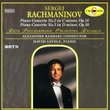| All Artists: Rimsky-Korsakov, Borodin, Karajan Title: Scheherazade / Dances Members Wishing: 0 Total Copies: 0 Label: Polygram Records Release Date: 10/25/1990 Genre: Classical Styles: Opera & Classical Vocal, Historical Periods, Modern, 20th, & 21st Century Number of Discs: 1 SwapaCD Credits: 1 UPC: 028941906328 |
Search - Rimsky-Korsakov, Borodin, Karajan :: Scheherazade / Dances
 | Rimsky-Korsakov, Borodin, Karajan Scheherazade / Dances Genre: Classical
|
Larger Image |
CD DetailsSimilar CDs
|
CD ReviewsRough at times, but great otherwise kv581 | Durham, NC United States | 01/11/2000 (4 out of 5 stars) "I bought this CD because of Scheherazade, but I found that the Borodin pieces are actually better performed. The music is highly melodic, and the Berlin Philharmonic played them with much enthusiasm. It was quite a pleasant surprise. However, Scheherazade was marred by mere average recording technology. Also, I feel that the Berlin Philharmonic did not play up to its potentials in this piece. The orchestra was not coordinated at times, especially the cymbal player. While this is indeed a disappointment, the excitement of the music still came through. Not very polished, but still very enjoyable." A Simply Breathtaking Violin Performance by Schwalbe! Octavius | United States | 10/11/2005 (5 out of 5 stars) "This 1967 performance by Karajan and Schwalbe is definitely one for the records although it is certainly not the best by Karajan specifically. Schwalbe's flawless performance as a virtuoso in Scheherazade however more than makes up for Karajan's shortcomings in both performances. I actually found more defects in Borodin's Dances than the suites which seemed to bother the previous reviewer. All of these defects are virtually trivial and technical ones though in my opinion and would in no way bother most listeners.
Nikolai Rimsky-Korsakow was an accomplished Russian composer of the Late Romantic period who was perhaps the foremost master of his contemporaries at composing very lyrical fantasy suites based on Arabian motifs such as this one. The themes in Russian art such as music and literature tend to strongly reflect their cultural values which are founded in grandiose fatalism akin to Tolstoy and Pushkin's literary works. Other than with the nationalist themes of the '1812 Overture', Tchaikovsky is actually not one of the best Russian composers to reflect this as his works tended to remain more along the conventional Western European formats of composition as opposed to Korsakow or Borodin who have much more of this Russian motif of fatalism to their works. Tchaikovsky was actually the least popular composer in Russia during his time primarily for his lack of Russianness in his works. Korsakow chose his stories well in conveying such themes of fatalism as Arab culture is also very fatalistic as demonstrated in the Arabian Nights on which this work is based. In this piece, Sheherazade is held captive by the Caliph of Baghdad and is reciting to him the tale of her love Sinbad and his epic adventures. She is crying through most of her recital and the violin reflects her despair while the bassoon is the Caliph that interacts with the violin. Other characters are represented by various interwining solo instruments while the grandiose epic events make their presence known with the brass and percussion that carry the bulk of work. This is one of the greatest epic suites and violin works ever composed and should definitely be in every classical music lover's collection. As for the peformance itself, this 1967 recording is remastered and sounds pretty good. This is probably not one of Karajan's most epic directions but the violin work for Scheherazade is mesmerizing. Schwalbe puts a lot of passion in this performance and glides the bow in complete confidence to bring out the intense and dramatic lyricism required by the piece. I would rate his performance here as highly as that of any of the more known violin virtuosos such as Heifetz or Perlman. The Polovstian Dances for me were a little more deficient than Sheherazade in that Karajan seemed at points uneven with the pace of the dances and there's also no choir in this rendition. Despite some of the problems with the performances here, these are still some of the best you can get for these particular compositions. For Russian lyrical pieces as the ones here, German or Eastern European tradition violinists such as Perlman or Heifetz are always good choices. Schwalbe here matches all of them in every way in his outstanding violin performance for Sheherazade. A great purchase!" |

 Track Listings (6) - Disc #1
Track Listings (6) - Disc #1








